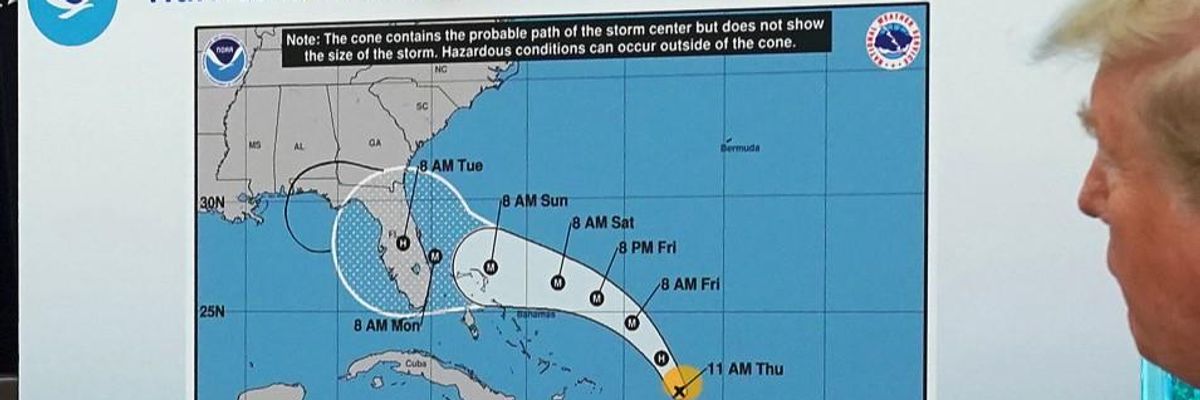An independent investigation found Monday that the Trump-appointed leader of the National Oceanic and Atmospheric Administration and another former official violated the agency's scientific integrity policy last year when they released a statement backing up the president's claim that Hurricane Dorian was expected to hit Alabama.
Last September, Trump claimed Alabama would "most likely be hit (much) harder than anticipated" by the Category 5 hurricane, contradicting meteorologists' projections that the storm would mainly affect Florida.
After the National Weather Service's Birmingham, Alabama office tweeted that the president's claim was inaccurate, the president appeared in the Oval Office to display a map altered with a black marker to show the storm's path extended to include Alabama, in an incident widely derided as "Sharpiegate."
"We're about to be in another hurricane season and we're going to have more natural disasters like pandemics and there don't seem to be any consequences for manipulating the science, and that puts real communities, real people at risk."
--Andrew Rosenberg, Union of Concerned Scientists
According to the report Monday from the National Academy of Public Administration (NAPA), acting administrator Neil Jacobs and then-deputy chief of staff and communications director Julie Kay Roberts bowed to political pressure two days after the president's Oval Office appearance when they released a statement rebuking the National Weather Service.
"The Birmingham National Weather Service's Sunday morning tweet spoke in absolute terms that were inconsistent with probabilities from the best forecast products available at the time," said the statement.
NOAA's scientific integrity policy prohibits political interference in the agency's communications about its scientific findings. NAPA found that Roberts and Jacobs, a Trump appointee, violated the agency's code for science supervision and management by releasing the statement, which "compromised NOAA's integrity and reputation as an independent scientific agency."
"Dr. Jacobs and Julie Roberts did not believe it was a good idea to release a statement, but felt significant external pressure to do so," wrote Stephen M. Volz, NOAA's assistant administrator for satellite and information services, in a memo attached to NAPA's final report.
The report did not recommend any consequences for Jacobs and Roberts, instead recommending "scientific integrity training" at the agency and calling on the Commerce Department's inspector general to investigate such violations.
Andrew Rosenberg, a former NOAA administrator who joined two current employees and Rep. Paul Tonko (D-N.Y.) in calling on NAPA to investigate "Sharpiegate," expressed frustration that Roberts and Jacobs would not be held accountable for their actions.
"This is important stuff," Rosenberg, who now leads the Union for Concerned Scientists, toldThe Hill. "We're about to be in another hurricane season and we're going to have more natural disasters like pandemics and there don't seem to be any consequences for manipulating the science, and that puts real communities, real people at risk."
The report was released following numerous reports of Covid-19 infection and death rates being manipulated by state public health officials. Rebekah Jones, a government data scientist in Florida, said in May that she was fired for refusing to manipulate numbers "to drum up support for the plan to reopen."
In early May, the White House Council of Economic Advisors released a model showing Covid-19 deaths falling to zero by May 15. Since May 15, there have been about 20,000 new cases detected in the U.S. per day, and deaths have gone up to more than 116,000.
